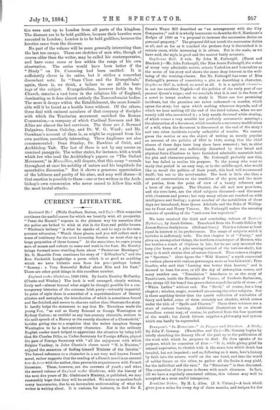We have received the third and concluding volume of Teutonic
Mythology, by Jacob Grimm. Translated from the Fourth Edition by James Steven Stallybrass. (Bell and Sons.) This is a volume at least equal in interest to its predecessors. The range of subjects which it includes is sufficiently wide. The first chapter is of " Poetry," and gives us, among other things, the northern counterpart of Hermes, who has besides a touch of Orpheus in him, for ho not only invented the harp (the bones of a pike serving instead of the tortoise-shell), but sang to it such strains that all nature listened. Then comes a chapter on " Spectres." Here figure the " Wild Hunter," a myth connected in various places with various personages more or less historical ; Frau Gauden, who said that "hunting was better than heaven," and is doomed to hunt for ever, or till the day of redemption comes, and many another one. " Translation " introduces to us the story of Tannlauser, inside the Mountain of Venus ; of Frederic Barbarossa, who sleeps till his beard has grown thrice round the table of stone ; of " White Ladies" without end. The "Devil," of course, has a long chapter ; witches, magic, werewolf are among the other subjects. Nor is there anything better than the quaint collection of curiosities of fancy and belief, some of them certainly not obsolete, which comes under the title of " Spells and Charms." These three volumes are a store of curious learning. Additional illustrations to an almost boundless extent may, of course, be gathered from the four quarters of the world ; but Jacob Grimm supplies a philosophy and system which can hardly be superseded.


































 Previous page
Previous page